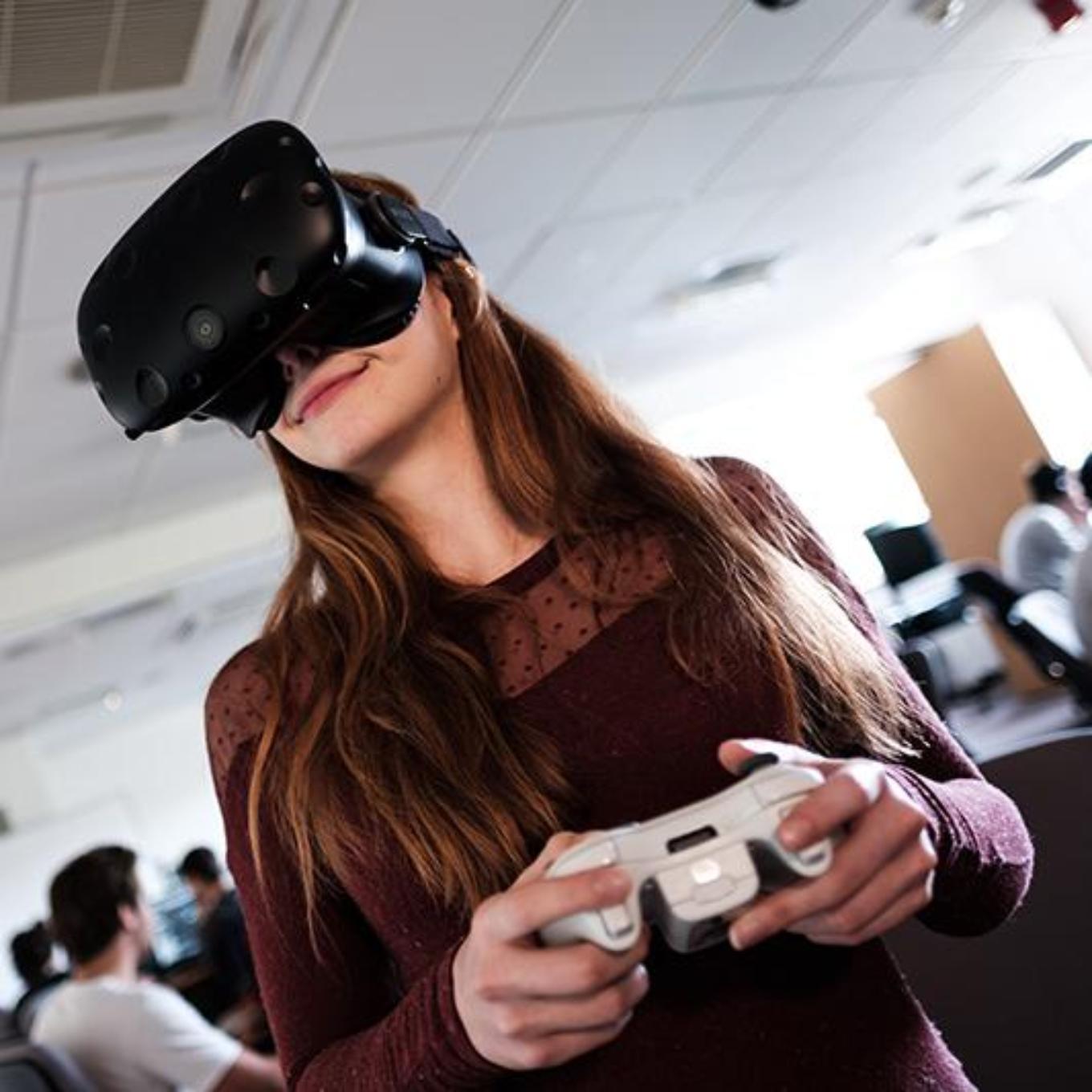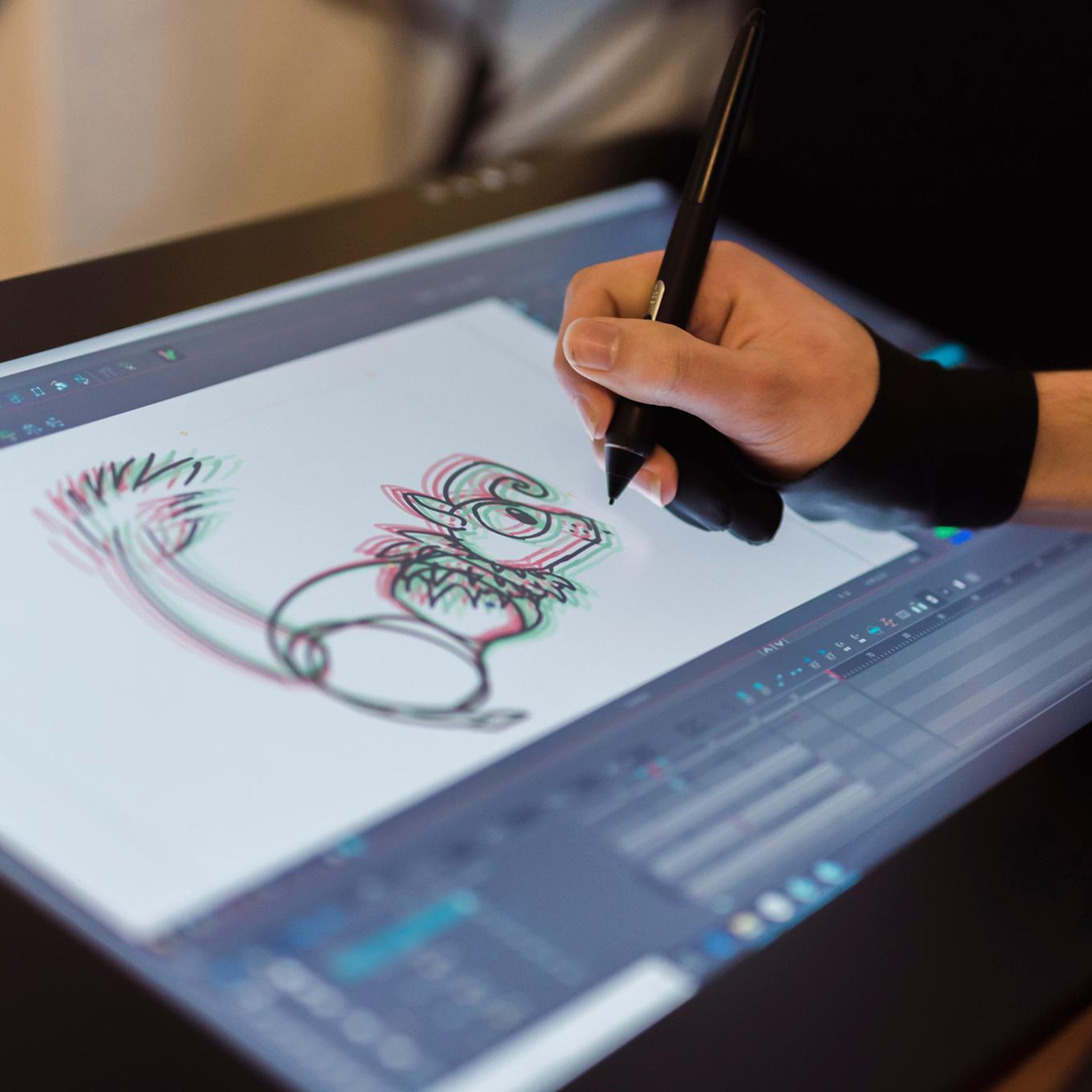MSc Computer Game Development

Course details
Year of entry
2026
Duration
1 YR (FT) 2.5 YRS (PT)
Institution Code
G53
Location
Wrexham
Course Highlights
Contact
with industry representatives through regular guest lectures, seminars and events.
Develop
a strong games/media business plan along with leadership & management skills.
Work
with the latest tools and technology in a specialist studio dedicated to design & production.
Why choose this course?
This course delivers the expertise required to professionalise the design and development of technical elements for highly polished game projects. The course facilitates graduates in games programming, AI design, game design, game engines, and game-based research to build a professional technical portfolio with an enhanced specialist skill set.
You will:
- Gain valuable experience and insight by having the creative freedom to manage the development of your own game projects
- Have full access to the Creative Industries Building, including primary access to our modern Game Development Suite, Design Studio, Podcast Suite, and TV Studio
- Enjoy the benefits of close industry engagement with regular visits, notable guest speakers, presentations, discussion groups, and social events
- Benefit from our internal Mentorship system, providing the opportunity to be matched with an experienced postgraduate student
- Build a strong set of critical employability skills across technical and professional areas to support you into industry or self-employment
- Join the flourishing network of Welsh creatives
Key course features
- This course emphasises projects and portfolio work to allow you to demonstrate skills through content development and portfolio pieces.
- The course will train you in the character and creature production workflows, from the concept phase through to full game engine implementation.
- Explore Game Engine technologies with a focus on the use Unreal Engine 5 to create highly detailed real-time Environmental Art.
- Develop strong 2D & 3D design work, including Software packages such as Adobe Suite, Autodesk Maya, Substance Painter, and ZBrush.
- Collaborate with students across the Games and Media department to put together highly specialised teams with strengths in programming, design, art, and audio.
What you will study
The programme has a strong technical focus with emphasis on professional quality throughout.
Areas covered include professional 3D modelling and sculpting skills, with respect to 3D topology and optimisation of assets to ensure fitness for purpose. Other topics of focus will include the design and development of game applications, along with an understanding of modern publication and distribution processes.
You will learn to analyse and optimise game applications with respect to technical performance and user experience. In addition, modern development and problem-solving strategies for artificial intelligence within games will play an important role.
MODULES
- Artificial Intelligence for Games: This module explores the current and emerging techniques and technologies for Artificial Intelligent elements within game projects. You will be tasked with breaking down and studying complex existing systems before being tasked to replicate AI strategies within a context of your choice.
- 3D Games Technology: This module facilitates the design and implementation of immersive/emerging game technologies within a 3D prototype. This module will allow you to approach 3D technology and asset production from a range of design and technical perspectives to support your ongoing specialist practice.
- Research Methods for Digital Technologies: This module is designed to train a postgraduate level of analysis and evaluation of game-based research ideas and proposals. You will be required to follow an in-depth game-based research process and plan and deliver your own research project.
- Advanced Systems and Mechanics: This module facilitates further advanced understanding of games programming within systems and mechanics. You will need to demonstrate technical skills by producing a game prototype within a contemporary or emerging platform to create a professional portfolio piece showcasing visual and non-visual development practices.
- Game Design & Player Analysis: This module guides you to explore the wider effects of a game-based artifact on the player. You will be required to plan and deliver a research project that maps a specialist piece of work against contemporary issues in the games industry such as game addiction, transgressive aesthetics and flow theory.
- Game Industry & Professional Enterprise: This module facilitates the holistic view of your specialist practice within the contemporary and emerging game industry. You will be required to plan and implement meaningful continuous professional development and reflective practice to enhance your employability skills and journey.
- Dissertation Project: In this flagship postgraduate module you will demonstrate mastery of a specific area of a subject and exhibit deep research and technical skills. You will be required to plan and implement a course of research which includes a research proposal, literature review, a developed artifact, data gathering and analysis to produce a full dissertation project.
- Mentorship In Technology (Optional): This optional module will allow you to partake in an internal mentorship process with undergraduate students. You will receive training sessions on the appropriate mentorship strategies and will be matched with groups of undergraduate students to share experiences and develop enhanced employability and professional skills.
Entry requirements & applying
The standard entry requirement for this programme is an honours degree of at least 2:2 classification in a Computer Science related subject area, or equivalent in any science-based degree with a strong computing element.
Applicants with substantial commercial or industrial experience, or graduates coming from non-computing backgrounds may be accepted, subject to interview and references.
Teaching & Assessment
How you’ll be taught
Teaching and learning on this course are designed to support students from a variety of diverse backgrounds. Students will be able to access their tutors both during sessions and outside of sessions to get help and support from their tutors. Where relevant, additional staff may be part of the learning environment to support, such as Learning Support Assistants, Personal Assistants, and Sign Language interpreters.
This course uses a combination of learning environments including significant use of computer lab rooms, production and assessment meeting rooms, collaborative working environments, and lecture theatres. All delivered sessions will be supported by our VLE platform Moodle, with content such as internal and external videos, lecture slides, additional notes, and important links and files that will always be available.
During your first year of study, you will be timetabled into four tutor-led sessions a week, usually over three days, with the remaining time suggested for self-directed learning. These directed sessions will run at between two or three hours each depending on the module. Some modules will be taught with the wider games suite and will include students from other games courses, and some will be purely for students on Computer Game Development. All modules are delivered within the games team with the games suite.
How you’ll be assessed
Due to the nature of the subject, the course is portfolio-focused with students creating work that represents their development and has no formal exams.
Assessment methods include the production of games and game elements, practical work, presentations and pitches, assessment meetings, technical documentation, production data, and portfolio submissions. Additionally, during project modules, additional strategies will be in place to track and balance work within teams to ensure fair assessment and consistent development over longer periods of time.
Teaching and Learning
We offer workshops and support sessions in areas such as academic writing, effective note-making and preparing for assignments.
Students can book appointments with academic skills tutors dedicated to helping deal with the practicalities of university work. Our student support section has more information on the help available.
In terms of particular needs, the University’s Inclusion Services can provide appropriate guidance and support should any students require reasonable adjustments to be made because of a recognised prevailing disability, medical condition, or specific learning difference.
Career prospects
Our dedicated Careers and Employability team is committed to helping you achieve your professional goals. They provide personalised advice, useful resources, and extracurricular employability events to prepare you for the job market.
Graduates of this course can pursue careers in:
- Gameplay Programmer
- Game Designer
- Level Designer
- 3D Asset Artist
- Technical Artist
- Producer
- QA Test Analysis
- AI Programmer
- Software Engineer
- UI/UX Developer
- Scrum Master
Fees & funding
You do not have to pay your tuition fees upfront.
The fees you pay and the support available will depend on a number of different factors. Full information can be found on our fees & finance pages. You will also find information about what your fees include in the fee FAQs.
All fees are subject to any changes in government policy, view our postgraduate fees.
International
This course is open to international students, for information about the university’s entry requirements for EU/international students, please visit our international section.

